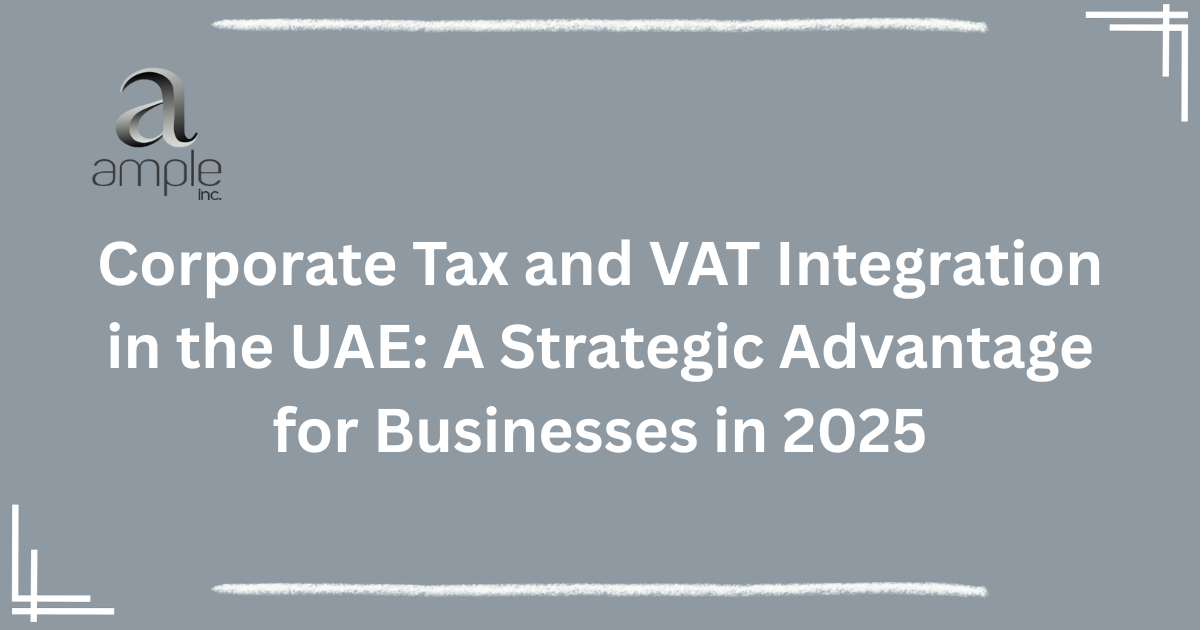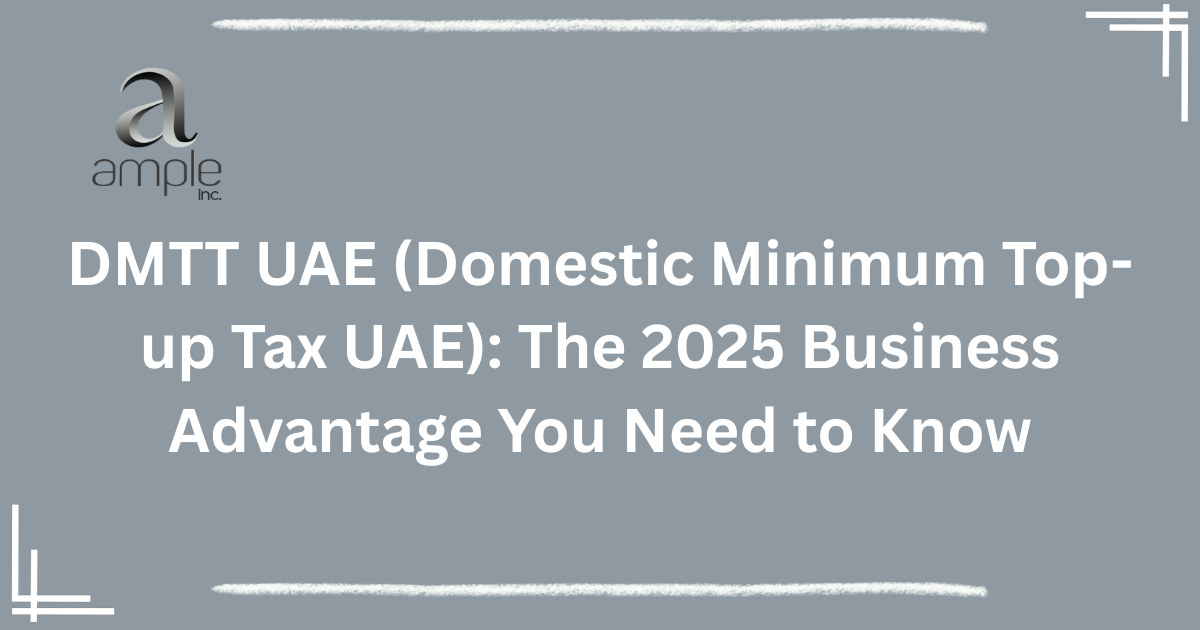Introduction
Corporate tax bookkeeping UAE has become a critical priority in 2025 as the country’s financial regulations evolve. With the 9% corporate tax now levied on profits above AED 375,000 and increasingly complex VAT regulations, businesses face heightened challenges in compliance. Maintaining precise bookkeeping is no longer optional it’s a legal necessity. This guide provides UAE-focused strategies to ensure your corporate tax bookkeeping not only keeps you compliant but also optimizes financial performance and reduces risk.
1. UAE Tax Framework: Corporate and VAT at a Glance
Corporate Tax
- Effective Date: 1 June 2023
- Rate: 9% corporate tax on taxable income above AED 375,000. Income below this threshold remains at 0%, benefiting many SMEs.
- DMTT (Domestic Minimum Top-up Tax): From 1 January 2025, large multinational enterprises (MNEs) with global revenues above €750 million will face a 15% top-up tax under OECD Pillar Two rules.
- Free Zone Entities: May retain 0% corporate tax if they meet qualifying conditions, including substance requirements and limits on non-qualifying income.
VAT
- Standard Rate: 5%
- Mandatory Registration Threshold: AED 375,000 taxable supplies.
- Voluntary Registration: Above AED 187,500 taxable supplies.
The combination of corporate tax, VAT, and international tax frameworks signals a shift toward a highly regulated business environment making corporate tax bookkeeping UAE practices critical.
2. Why Corporate Tax & VAT Compliance Start with Sound Bookkeeping
Accurate bookkeeping is the foundation of tax compliance. It:
- Calculates taxable income accurately to apply profit thresholds and exemptions correctly.
- Ensures VAT is correctly applied, recorded, and reported.
- Creates an audit trail to avoid disputes and penalties.
- Prevents costly errors, like a business owner who received a AED 10,000 fine for late corporate tax registration.
Key takeaway: Your corporate tax bookkeeping UAE strategy is the bridge between compliance and financial efficiency.
3. Best Practices for Corporate Tax Bookkeeping in the UAE
A. Choose the Right Accounting Method
While cash basis is simpler, the accrual basis is recommended for corporate tax revenue and expenses are recognized when incurred, not when cash changes hands. This aligns with FTA expectations.
B. Use Cloud-Based, FTA-Compliant Software
Cloud solutions like QuickBooks, Xero, and Zoho Books:
- Automate VAT tracking.
- Support real-time data capture.
- Simplify FTA reporting.
Choose software that stores both digital and physical records for seven years the FTA can request either.
C. Maintain Dual Records for VAT & Corporate Tax
- VAT: Transaction-level detail.
- Corporate Tax: Profit and loss data.
Separate ledgers or tagging systems make reporting easier and error-free.
D. Conduct Regular Internal Audits
Monthly or quarterly internal checks help identify mismatches in VAT returns, expense reports, or taxable profit calculations early.
E. Uphold Strong Document Retention
Keep invoices, receipts, contracts, and reports (digital & physical) for at least seven years to be audit-ready.
F. Leverage Expert Guidance
Professional tax advisors navigate exemptions, free zone incentives, and transfer pricing rules for large businesses.
4. VAT-Specific Bookkeeping Considerations
- Automate VAT tagging to avoid misclassification.
- Use software that auto-populates VAT returns.
- Track deadlines with automated reminders to avoid penalties.
- For multi-rate transactions, maintain detailed classification records.
5. Corporate Tax Compliance: Advanced Considerations
A. Understand Profit Thresholds and Reliefs
- Profits ≤ AED 375,000: 0% tax.
- Profits > AED 375,000: 9% tax.
- Small Business Relief: Available to businesses with ≤ AED 3 million revenue until 2026.
B. Adjust for Non-Deductible Expenses
Fines, entertainment expenses, and certain donations cannot be deducted from taxable income.
C. Register & File on Time
Corporate tax returns must be filed within nine months after the financial year ends late filing invites fines.
D. Transfer Pricing Compliance
Large entities with cross-border related transactions must maintain transfer pricing documentation and ensure arm’s length pricing.
6. Aligning Bookkeeping with Tax Strategy
- Choose accounting methods that enhance tax efficiency.
- Identify non-deductibles early to avoid last-minute adjustments.
- Track eligibility for incentives like R&D credits or free zone benefits.
7. Practical Workflow for UAE Businesses
- Select FTA-compliant cloud bookkeeping software.
- Set up workflows for VAT tagging, accrual entries, and reconciliations.
- Train your finance team on compliance rules.
- Conduct monthly reconciliations and threshold checks.
- Keep records securely for seven years.
- Work with advisors to refine your tax strategy annually.
8. Real-World Insights from UAE Businesses
One Dubai SME owner shared:
“We missed the corporate tax registration deadline and received a fine. Automated reminders would have saved us thousands.”
Another free zone operator noted:
“Opening a mainland branch changed our tax rate from 0% to 9% overnight. Structure matters more than most realize.”
These experiences prove that proactive corporate tax bookkeeping UAE practices are vital for avoiding costly mistakes.
9. FAQs on Corporate Tax Bookkeeping UAE
Q: What profits are subject to corporate tax?
A: Net profits above AED 375,000 are taxed at 9%.
Q: What is the DMTT?
A: A 15% top-up tax for MNEs with global revenues over €750 million, effective 1 January 2025.
Q: How long must I keep records?
A: At least seven years in both digital and physical form.
Q: Is cloud bookkeeping necessary?
A: Not legally required, but essential for accuracy, speed, and audit readiness.
Q: What are non-deductible expenses?
A: Fines, entertainment, certain donations, and related-party transactions without arm’s length pricing.
10. Conclusion
Ensuring accurate and compliant bookkeeping in the UAE is not just about avoiding penalties — it’s about creating a strong financial foundation for growth. By implementing these strategies, businesses can meet corporate tax and VAT requirements while improving efficiency.
If you need professional bookkeeping, VAT filing, or corporate tax advisory services in the UAE, our experts at Ample Inc can help you streamline compliance and boost your business’s financial health. Explore our related services:
Accounting and Bookkeeping Solutions



